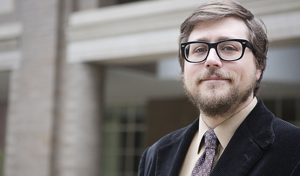The Wealth & Poverty Focus on Africa series presents Ohio University alum Aggrey Otieno on “Community organizing as a tool for social change: A case study of Korogocho slum, Nairobi – Kenya” on Sept. 22 from noon to 1 p.m. in Alden 319.
 Abstract: Korogocho was a land of unemployment, inadequate health facilities, and high rates of HIV/AIDS, poor educational facilities, high crime rate; prostitution and several delinquent gangs have been the main themes in most academic publications and journalistic articles. Over the years, the residents of Korogocho have been treated as second-class citizens, just like the name which was borrowed from a Kikuyu man nicknamed Kurugucu, meaning worthless or scrap.
Abstract: Korogocho was a land of unemployment, inadequate health facilities, and high rates of HIV/AIDS, poor educational facilities, high crime rate; prostitution and several delinquent gangs have been the main themes in most academic publications and journalistic articles. Over the years, the residents of Korogocho have been treated as second-class citizens, just like the name which was borrowed from a Kikuyu man nicknamed Kurugucu, meaning worthless or scrap.
The themes are now changing to a Korogocho full of business opportunities, better road networks, improved literacy rate, reduced maternal and neonatal mortality, good street lighting system, and improved garbage collection system among others, thanks to the community organizing efforts that have been initiated by the residents in the last decade. Aggrey Willis Otieno, an alumnus of Ohio University, as a person who was born in Korogocho, have been part of the engine that ignited the community organizing efforts that has brought significant social change to a once looked-down-upon slum. Social change agents usually ponder over several questions as they plan to carry out community projects. For example, different ways to improve their communities, and how to do all of the tasks, small and large, that make grassroots efforts work and work well. What are the overarching strategies that work to improve communities? Why do some grassroots efforts fail, while others do great things and flourish? By giving examples from his current and past community organizing work in Korogocho, Otieno offers community organizing as a strategy to social transformation—the idea that people can and should come together to talk about what matters to them, and then work together to successfully change their communities using locally available resources.
Otieno is the 2012-2014 Rolex Laureate and the 2013 African Children Hero award winner. He is an alumnus of Moi University, and a former Ford Foundation fellow at Ohio University, USA. Otieno is an mHealth geek and expert in communication and development with immense experience in international development, community media development, health communication, democratic governance, rights based programming and research with significant exposure in resource mobilization, project design, management, monitoring and evaluation. His devotion is to provoke the poor and marginalized into conceptualizing ideas, developing and implementing strategies that strengthen their participation in fighting injustices and inequalities that cause poverty. He believes in the goodness of people and has been part of numerous initiatives in search of a better world that is free of injustices, inequalities and all forms of human rights violation. Otieno has been the engine that ignited several projects in Kenya. For example, he has initiated anti- child trafficking project, school sponsorship project, community media projects, telemedicine, empowered families of deaf children to advocate for the rights of their deaf children, supported various income generating projects for the urban poor amongst others. In his work, Otieno has also carried out extensive research on children and women in Kenya. He is the author of “Condemning women to early graves: Innovating new approaches to combating maternal and neonatal mortality in Kenya” and “Improving Health Communications in Kenya: A feasibility study on engaging Frontline Health workers in Using Mobile Technology. When not immersed in the world of communication & development, Otieno likes to analyze political, economic and social events around him. One day when he is done with the politics of development, he plans to go into the development of politics in Kenya.



















Comments